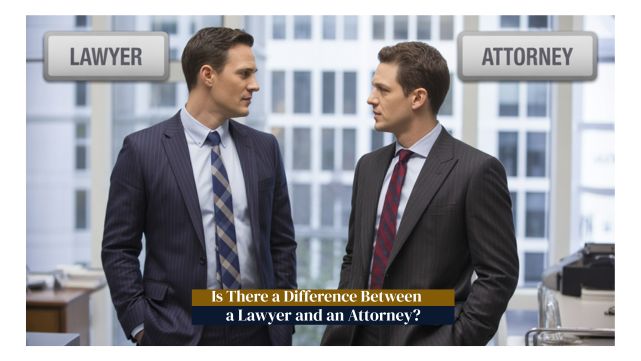When searching for legal help in Colorado Springs, you’ll notice some professionals advertise as “lawyers” while others use “attorney.” Are these simply two names for the same profession, or does the distinction carry meaning?
The answer reveals a fascinating journey through legal history, language evolution, and international legal systems.
The Historical Origins: Two Words, Two Different Meanings
These terms emerged from different linguistic roots, each reflecting a distinct aspect of legal practice.
The Word “Lawyer” and Its Academic Roots
The term “lawyer” entered English vocabulary during medieval times, evolving from words meaning “one learned in law.” Its etymology emphasizes education and knowledge—someone who has studied legal principles and can interpret them for others.
The word fundamentally describes a person with legal training and expertise, focusing on their scholarly understanding of legal doctrine.
“Attorney” and the Concept of Representation
In contrast, “attorney” developed from a concept meaning to act on someone else’s behalf. The word’s origins relate to appointing someone to represent your interests or conduct business in your name.
This representational foundation explains why we still use “power of attorney” to describe authorization for someone to manage another person’s affairs—even when that person has no legal training whatsoever.
The linguistic origins reveal an important historical distinction: one word emphasized legal knowledge while the other emphasized advocacy and representation.
England’s Split Role Legal System
To understand why English-speaking nations developed different terminology, we must examine how the British organized their legal profession—a structure that profoundly influenced legal systems worldwide.
The Division Between Solicitors and Barristers
England and Wales developed a split legal profession with two distinct roles. Solicitors served as the primary contact point for clients, handling document preparation, legal advice, transaction work, and case preparation.
Barristers, conversely, specialized exclusively in courtroom advocacy, particularly in higher courts. Clients hired solicitors, who then engaged barristers when courtroom representation became necessary.
This division created geographical patterns as well. Superior courts historically operated primarily in London, concentrating barristers in the capital while solicitors served communities throughout the country.
The system required extensive training for each role, with barristers typically working from shared offices called “chambers” and solicitors operating traditional law offices.
Why Britain Stopped Using “Attorney”
Interestingly, British legal professionals once commonly used “attorney” to describe what are now called solicitors. During the late 1700s, practicing attorneys were excluded from certain legal societies, gradually shifting the profession toward the term “solicitor” instead.
Today in Britain, “attorney” appears almost exclusively in governmental titles like Attorney General, while practicing legal professionals identify as solicitors or barristers.
Attorney vs. Lawyer: America’s Simplified Approach
American colonists imported English common law traditions but adapted them significantly to create a fundamentally different legal structure.
No Professional Split
Unlike Britain, the United States never established formal divisions between different types of legal professionals. American lawyers trained to handle both transactional work and courtroom advocacy.
An American attorney might draft contracts in the morning and argue motions in the afternoon, something quite common in my practice as a criminal defense and personal injury lawyer.
American lawyers could truly call themselves either “lawyer” or “attorney”(even under the old definition), because they performed all legal functions. The representational aspect inherent in “attorney” and the knowledge aspect of “lawyer” both applied equally to American legal practitioners.
Historical Nuance: Attorneys-in-Fact
One historical distinction did exist: “attorneys-in-fact” versus “attorneys at law.” The former were individuals authorized to handle someone’s affairs through power of attorney, requiring no legal training. A good example of this is when you give a non-lawyer a power of attorney. It doesn’t make them a lawyer, but it does give them legal power to act on your behalf.
Modern American Practice: Are They Really the Same?
This question generates surprising debate, even among legal professionals themselves.
The Regulatory Reality
American state bar associations, the bodies that license and regulate legal professionals, make absolutely no distinction between these terms. Colorado’s Supreme Court, which oversees attorney licensing, uses both words interchangeably in its rules and regulations. The American Bar Association similarly treats them as equivalents.
When you verify someone’s credentials through the Colorado State Bar website, you won’t find separate categories. You’re either licensed to practice law or you’re not. If licensed, you may accurately describe yourself using either term without restriction or qualification.
Standard dictionaries, including specialized legal dictionaries, define these words as synonyms. The U.S. Department of Labor’s occupational classifications don’t distinguish between them.
The Claimed Technical Difference
Despite official equivalence, some sources argue for a subtle distinction: all attorneys are lawyers, but not all lawyers are attorneys. Under this interpretation, “lawyer” broadly encompasses anyone with legal education, while “attorney” specifically denotes someone actively representing clients.
This would suggest that a law school graduate who never passed the bar exam might call themselves a “lawyer” but not an “attorney.” Similarly, a licensed professional working as a legal consultant or professor without representing clients might be a “lawyer” but not technically an “attorney.”
Why This Distinction Lacks Practical Meaning
Several factors undermine this claimed lawyer vs attorney difference. First, nearly every state now requires attorneys to have graduated from law school, eliminating any meaningful category of “lawyers” without bar admission. Only California, Vermont, Virginia, and Washington still permit alternative paths to bar admission.
You may have heard about one famous non-lawyer trying to become admitted to the bar without going to law school. Kim Kardashian, whose father was a well-known lawyer, has been attempting to pass the California bar (unsuccessfully, so far).
The Bar Exam is one way to protect potential clients from lawyers who have not been minimum standards of legal knowledge as set by the State Bar. Law School is important, it’s 3 years of serious study to prepare a prospective lawyer for a very important and difficult job.
As a personal note, I would definitely prefer a doctor who went to medical school to perform my appendectomy over someone who crammed for the medical boards. That being said, on-the-job training for a lawyer is incredibly important. That is why many lawyers in my field of criminal defense started out as either District Attorneys or Public defenders.
I was a Deputy DA for several years before going into private practice. This gave me the opportunity to handle thousands of cases, and to develop my skills as a litigator. That time was incredibly valuable to my growth as a young attorney.
Second, unauthorized practice of law statutes strictly regulate who can describe themselves as legal professionals. Paralegals, legal assistants, and notaries face severe penalties for representing themselves as lawyers or attorneys.
But these statutes don’t distinguish between the two terms for licensed professionals—you either have authorization to practice law or you don’t. It is a felony in Colorado to engage in the unauthorized practice of law.
Third, professional responsibility rules govern how attorneys describe their services and credentials. These ethics codes make no distinction between using “lawyer” versus “attorney” in advertising or communications.
Most tellingly, legal professionals themselves don’t perceive any meaningful difference. Many use the terms interchangeably within the same conversation, selecting whichever word feels natural in context.
Understanding Related Legal Titles
Here are some additional legal terms or titles that deserve explanation:
1. Esquire
The designation “Esq.” after someone’s name indicates they’re a licensed attorney. Originally referring to assistants to English knights, the title evolved into an honorary designation for American lawyers. Its use is entirely optional and carries no legal significance—it’s purely stylistic convention.
A lot of attorneys use it after their name to denote their occupation. In Bill and Ted’s Excellent Adventure, Bill refers to himself as “Bill S. Preston, Esquire.” Bill was still in High School, so obviously not a lawyer yet. Giving Bill the benefit of the doubt, maybe he served as a knight’s squire on one of his trips though time.
2. Counsel
“Counsel” generally refers to legal advisors, often specifically describing attorneys employed directly by organizations rather than hired from external firms. Companies have “general counsel” or “in-house counsel”—full-time employee attorneys. However, “counsel” also appears in phrases like “legal counsel” as a general term for legal representation.
3. Counselor or Counselor-at-Law
Some attorneys prefer this designation because it emphasizes their advisory role rather than adversarial litigation. The term highlights problem-solving and guidance rather than courtroom work. I have both on my office sign, as I think both roles are an important part of my practice.
I have been through many cases similar to what my clients are going through, I know the risks and rewards, and am able to provide counsel based on experience. If you are going through a tough case, like a DUI, I have likely handled something very similar many times.
I hope you haven’t been through a drunk driving case thousands of times to understand the nuances of a case, what the real potential risks are, how strong/weak your case is, etc. In my practice, I counsel clients based on my experience and knowledge of the facts, law, and other attendant circumstances, which may be aggravating or mitigating.
4. Advocate
In American usage, “advocate” informally describes someone who advocates for clients’ interests. However, in some countries, “advocate” serves as the formal title for courtroom lawyers, equivalent to English barristers.
International Variations Matter
If you’re working with legal professionals internationally, terminology becomes critically important. Here are some of the terms I was able to find in some quick online research used around the world.:
- Canada typically uses “lawyer” rather than “attorney,” except in specific governmental titles.
- United Kingdom uses “solicitor” for transactional work and client advice, “barrister” for courtroom advocacy, with “attorney” rarely appearing except in official government positions.
- Australia maintains the solicitor/barrister split in some states while other jurisdictions have merged the professions, allowing individual lawyers to perform both functions.
- Ireland preserves both solicitors and barristers, though solicitors have gained expanded courtroom rights over recent decades.
- South Africa calls transactional lawyers “attorneys” and courtroom specialists “advocates.”
Understanding these international differences prevents confusion when dealing with foreign legal systems or international legal matters.
What Really Matters When Choosing Legal Representation
For Colorado Springs residents seeking legal help, the lawyer-versus-attorney debate is essentially irrelevant. Focus instead on factors that actually impact your legal outcome:
1. Licensing and Good Standing
Verify through the Colorado State Bar that your potential attorney holds an active license with no disciplinary issues. This matters infinitely more than which word they prefer.
2. Relevant Experience
A criminal defense attorney, family law attorney, and real estate attorney each possess dramatically different expertise. Ensure your attorney regularly handles cases like yours.
3. Local Knowledge
An attorney practicing regularly in Colorado Springs understands local court procedures, knows the judges and prosecutors, and can navigate the El Paso County legal system efficiently.
4. Specialized Background
Former prosecutors bring unique insights to criminal defense. Attorneys who’ve worked for insurance companies understand how insurers evaluate claims. This insider knowledge often proves more valuable than years of general practice.
5. Communication Style
Your attorney should explain legal concepts clearly without excessive jargon, return calls promptly, and keep you informed throughout your case.
6. Realistic Assessments
The best attorneys honestly evaluate your case’s strengths and weaknesses. Be wary of anyone guaranteeing specific outcomes—ethical attorneys can’t make such promises.
7. Manageable Caseload
An attorney handling fifty cases can provide more attention than one juggling two hundred. Ask about current caseload and how much time they’ll personally devote to your matter.
The Verdict on Lawyer vs. Attorney
In modern American legal practice, “lawyer” and “attorney” function as complete synonyms. Both describe someone who has completed law school, passed the bar examination, and holds a license to practice law in their jurisdiction. Any claimed distinction lacks regulatory recognition, professional consensus, or practical significance.
The historical origins differ, and international usage varies considerably, but within the United States these words are interchangeable. Choose your legal representative based on qualifications, experience, and compatibility—not on whether their business card says “lawyer” or “attorney.”
Expert Legal Representation in Colorado Springs
At McDowell Law Firm, we focus on results rather than titles. Attorney (or “lawyer,” is fine too) Joshua McDowell combines former prosecutor experience with dedicated defense representation, providing clients the strategic advantage of understanding both sides of criminal cases.
Our firm offers:
- Free initial consultations to evaluate your legal situation
- Local Colorado Springs expertise in Municipal Court, El Paso County Court, and throughout the 4th Judicial District
- Clear, jargon-free communication ensuring you understand your options and case status
- Focused attention through manageable caseloads that prioritize quality over quantity
- Insider knowledge from prosecutorial experience that strengthens defense strategies
Whether you need criminal defense representation, personal injury advocacy, or guidance through complex legal challenges, we provide experienced counsel tailored to your specific circumstances.
Don’t let confusion about legal terminology delay getting help you need. Call McDowell Law Firm today for a free, confidential consultation. We’ll explain your situation in plain language and outline realistic paths forward. 719-227-0022. Or email Attorney Josh McDowell directly at josh@pikespeaklaw.com
Your legal challenge deserves experienced, local representation. Contact us now to get started.



